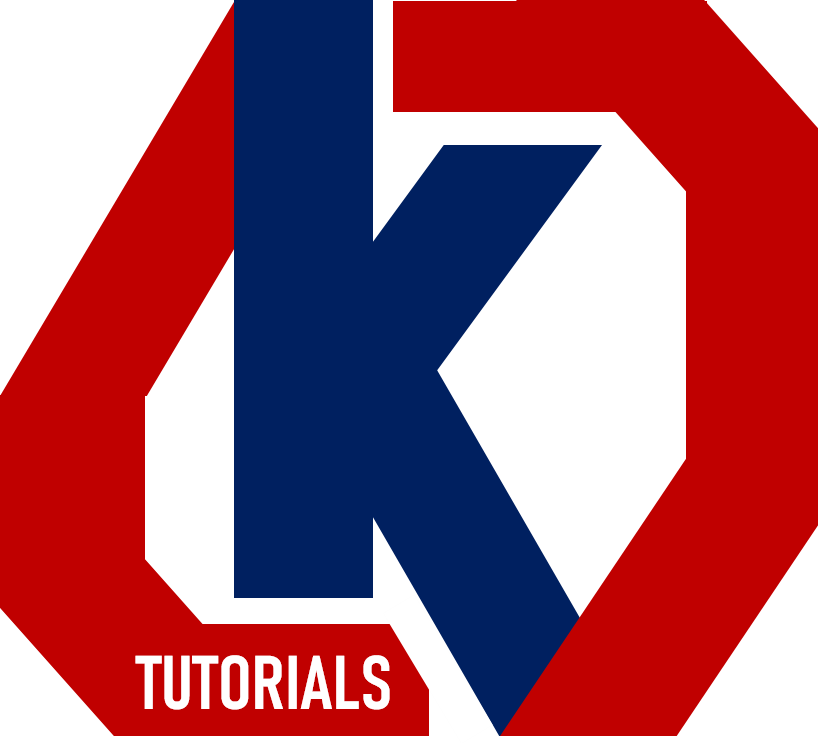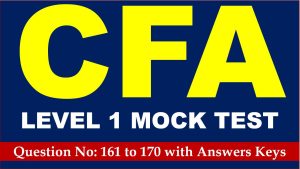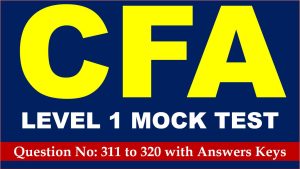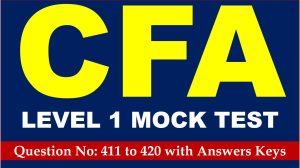Hi CFA Aspirants, welcome to AKVTutorials. Are you preparing for CFA Level 1, 2, 3 exams for making a career in CFA (Charted Financial Analyst). According to CFA Wikipedia, CFA The Chartered Financial Analyst (CFA) program is a postgraduate professional certification offered internationally by the American-based CFA Institute. A candidate who successfully completes the program and meets other professional requirements is awarded the “CFA charter” and becomes a “CFA charter holder”. Therefore, you need CFA Study Notes and Free CFA Level 1 Sample Quiz 30 Questions Answer Keys AMBIPin this article, you will get Free CFA Level 1 Mock Exam Practice Questions.
Free CFA Level 1 Mock Practice Exam Questions Bank
Free CFA Level 1 Practice Question No: 291:
With regard to international portfolios, if net performance is indicated, managers are required to disclose the assumed
___________ for the benchmark.
Option A: tax rate.
Option B: currency effects.
Option C: hedge.
Option D: disclosure.
Option E: differentials.
Show/Hide Answer
Option A : tax rate.
To be in compliance with the AIMR-PPS, the performance presentation for international portfolios must disclose whether composites and benchmarks are presented gross or net of withholding taxes on dividends, interest and capital gains; if net, the assumed tax rate for both the composite and the benchmark.
CFA Level 1 Exam Question No: 292:
Investments-R-Us is a growing investment advisory firm, which recently hired 5 CFA charter-holders for senior management positions. In an advertisement, the firm promised clients excellent client service and timely investment advice. To bolster this motto, all 5 CFA charter-holders were praised in the advertisement for their commitment, professionalism and high intelligence displayed in passing the CFA program in 3 straight attempts. IRU has
Option A: violated the AIMR Presentation Standards by selectively presenting its expertise in the field.
Option B: violated Standard II (A) – Use of Professional Designation – by implying superior results based on the fact that the CFA charter-holders passed every exam in first attempt.
Option C: none of these answers.
Option D: not violated any of standards in the AIMR code.
Show/Hide Answer
Option B : violated Standard II (A) – Use of Professional Designation – by implying superior results based on the fact that the CFA charter-holders passed every exam in first attempt.
Implications that CFA Charter-holders who pass their exams in the first attempt can generate superior results or display a higher level of intelligence are considered inappropriate by Standard II (A) of the AIMR Code of Ethics.
Free CFA Level 1 Mock Exam Question No: 293:
The Performance Presentation Standards are designed for
Option A: investment consultants.
Option B: current clients.
Option C: prospective clients.
Option D: all of these are beneficiaries of the AIMR Performance Presentation Standards.
Show/Hide Answer
Option D : all of these are beneficiaries of the AIMR Performance Presentation Standards.
The primary beneficiaries of the PPS are prospective clients wh are attempting to compare performance of different investment firms. However, current clients attempting to evaluate their investment managers performance also benefit from the PPS. Consultants may also use the information when evaluating performance data.
CFA Level 1 Free Practice Question No: 294:
Standard IV (B.6) deals with _________.
Option A: Preservation of Confidentiality.
Option B: Prohibition against Use of Material Nonpublic Information.
Option C: None of these answers.
Option D: Disclosure of Referral Fees.
Option E: Priority of Transactions.
Option F: Disclosure of Conflicts to Clients and Prospects.
Option G: Prohibition against Misrepresentation.
Option H: Performance Presentation.
Show/Hide Answer
Option G : Prohibition against Misrepresentation.
Standard IV (B.6) prohibits members from making statements that misrepresent the services they are capable of performing, their qualifications and their academic or professional credentials.
Free CFA Practice Question No: 295:
Standard II (B) is known as ________.
Option A: Professional Misconduct.
Option B: Fair Dealing.
Option C: Interactions with Clients and Prospects.
Option D: Preservation of Confidentiality.
Option E: None of these answers.
Option F: Prohibition against Use of Material Nonpublic Information.
Option G: Duty to Employer.
Option H: Investment Process.
Show/Hide Answer
Option A : Professional Misconduct.
Standard IV (A) deals with the Investment Process. Standard III
(B) deals with Duty to Employer. Standard IV (B.3) deals with Fai Dealing. Standard IV (B) deals with Interactions with Clients and Prospects. Standard V (A) deals with Prohibition against Use of Material Nonpublic Information. Standard IV (B.5) deals with Preservation of Confidentiality. Standard II (B) deals with Professional Misconduct.
CFA Level 1 Sample Question No: 296:
Members can comply with Standard IV (A. 1) by undertaking the following:
I. Analyzing basic investment characteristics
II. Analyzing portfolio needs of the client
III. Establishing compliance procedures to prevent violations of Code and Standards
IV. Maintaining files to support investment recommendations
Option A: I, II & IV.
Option B: II & IV.
Option C: I & IV.
Option D: I & II.
Option E: II, III & IV.
Option F: II & IV.
Option G: I, II, III & IV.
Option H: I & I.
Show/Hide Answer
Option A : I, II & IV.
Condition Ill applies to compliance with Standard III (E). For Standard IV (A. 1), which deals with the Investment Process, members should investigate the investment’s basic characteristics by looking at research reports. Also, a member has a continuing responsibility to review a client’s needs and circumstances to determine whether or not the risk exposure of the total portfolio serves the client’s needs. Finally, a member must maintain research files to justify investment decisions later under scrutiny.
Free CFA Level 1 Quiz Question NO: 297:
Standard V of the Standards of Professional Conduct deals with Relationships with and Responsibilities to _______.
Option A: Supervisors.
Option B: Employers.
Option C: Employees.
Option D: the Investing Public.
Option E: None of these answers.
Show/Hide Answer
Option D : the Investing Public.
Standard V of the Standards of Professional Conduct deals with Relationships with and Responsibilities to the Investing Public.
Free CFA Level 1 Quiz Question NO: 298:
Cornelius is a portfolio manager with Apex Investments, an investment advisory firm. Cornelius has, over the years, developed a special symbiotic relationship with Mike Milken, the owner of Milk ’em, Inc., a small brokerage firm. Cornelius puts subtle pressure on the trading desk at Apex to execute its trades through Milk ’em, thus generating brokerage revenue for Mike. In return, Mike recommends the services of Apex Investments to many of its clients. This arrangement is not disclosed to either the senior management at Apex nor to any of the clients. It*has been observed by many at Apex Investments that the commissions charged by Milk ’em are 10-15% higher than those by other brokers. However, Cornelius has justified the higher costs by pointing to the extra revenue-flow from Milk ’em.
Cornelius has:
I. not violated any AIMR standards.
II. violated Standard III (C) – Disclosure of Conflicts to Employer.
III. violated Standard IV (B.8) – Disclosure of Referral Fees.
IV. violated Standard IV (B. 1) – Fiduciary Duties.
Option A: II, III and IV only.
Option B: II and IV only.
Option C: I only.
Option D: II and III only.
Show/Hide Answer
Option A : II, III and IV only.
Cornelius is clearly in a situation representing a conflict of interests. His arrangement and non-disclosure of the arrangement are unfair to the current clients of Apex and potential clients recommended by Milk ’em. They represent a violation of his fiduciary duties to the clients. By not informing senior management at Apex about the arrangement, he has also violate Standard III (B) – Disclosure of Conflicts to Employer.
Free CFA Practice Question No: 299:
According to the Prudent Investor Rule, the trustee must: _________- adhere to
impartiality and prudence
– maintain overall portfolio risk at a reasonable level
– provide for reasonable diversification of trust investments
– act with prudence in deciding whether and how to delegate authority to ex and in selecting and supervising agents
– be cost conscious when investing
Option A: supervisors.
Option B: loyalty.
Option C: none of these answers.
Option D: commitment.
Option E: diversification.
Show/Hide Answer
Option B : loyalty.
Modern Portfolio Theory dictates that trustees consider a portfolio in its entirety and not just on an investment-by-investment basis. As a fiduciary, therefore, the trustee must:
– adhere to fundamental fiduciary duties of loyalty, impartiality and prudence.
– maintain overall portfolio risk at a reasonable level
– the trade-off between risk and return is the fiduciary’s central concern.
– provide for reasonable diversification of trust investments.
– act with prudence in deciding whether and how to delegate authority to experts and in selecting and supervising agents.
– be cost conscious when investing.
CFA Mock Exam Free Question No: 300:
Which of the following statements is correct regarding Standard II (A) Use of Professional Designation?
Option A: Joe Martin passed Level I and Level II of the CFA exams and is scheduled for the next Level III exam. He may write “Joe Martin, CFA II.”
Option B: All of these answers are correct.
Option C: Joe Martin passed Level I and Level Il of the CFA exams and is scheduled for the next Level III exam. He may write, “I am a Level III candidate in the CFA program.
Option D: joe Martin passed Level I and Level II of the CFA exams, but is not scheduled for the next Level III exam. He may write, *I am a Level III candidate in the CFA program.
Show/Hide Answer
Option C : Joe Martin passed Level I and Level Il of the CFA exams and is scheduled for the next Level III exam. He may write, “I am a Level III candidate in the CFA program.
“Joe Martin, CFA I|” is a misrepresentation and a violation of Standard II (A). There is no designation for someone who has passed Level I, Level II, or Level II. He may not state he is a candidate unless he is registered for the next exam.



